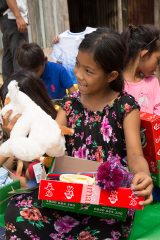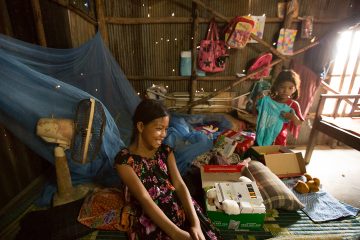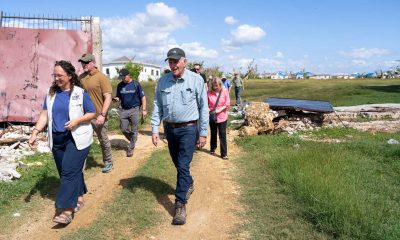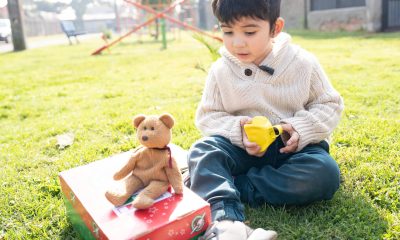In a nation still recovering from genocide and a brutal civil war, Operation Christmas Child shoeboxes help children and families experience God’s love
Eleven-year-old Yeoun had never received a present from anyone and she wasn’t about to miss this chance. She showed up at the church at 6 a.m., still wearing her blue pajamas and with hours still to go before the Operation Christmas Child shoebox gift distribution.
You Can Pack a ShoeboxYeoun’s parents are divorced and she lives with her grandmother. Her father left her mother, and her mother works several hours away in Cambodia’s capital city of Phnom Penh.
Divorce and poverty are common in Yeoun’s village. Most women in the village make bamboo mats and floor coverings, which doesn’t bring in much income.
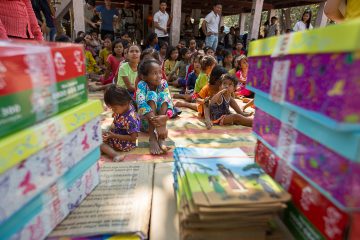
Yeoun and a crowd of children wait to receive their shoebox
“Life is hard here,” said Houn, the village leader. “The fathers leave the village for weeks and weeks for work.”
Houn’s four grandchildren each received a shoebox gift. His granddaughter, who’d never had jewelry and wanted it more more than anything, opened her box to find matching earrings, necklace, and bracelet.
Yeoun’s favorite item in her shoebox was a teddy bear. In those moments looking through her box, joy overcame the worries and struggles of her young life.
Houn and his family aren’t Christians, but he recognized something special the day the shoeboxes came to his village. “The children felt love,” he said.
It’s happening all across Cambodia. Children receive shoebox gifts and have an opportunity to experience God’s love. With that love comes hope for impoverished children trying to survive in a nation still reeling from genocide and a civil war that killed nearly one quarter of the population. The brutal Khmer Rouge regime wiped out an entire generation—nearly 75 percent of Cambodians are younger than 35 years old.
This year, about 90,000 shoeboxes were distributed throughout 18 provinces in Cambodia. Each child who received a shoebox also received The Greatest Gift, a booklet that presents the Good News of Jesus Christ.
Nearly 700 churches in Cambodia will enroll children this year in The Greatest Journey, our 12-lesson discipleship program for children who receive shoebox gifts.
A Church for Nimol’s Village
Children in Cambodia are growing up with parents who are part of a generation struggling to trust again after the Khmer Rouge destroyed culture and values they held dear. They’re fighting to remember what life was like when love and family were cherished—before the regime taught them distrust and hatred.
Nimol, a sweet, shy fourth grader, is one of those children. The unpaved, dusty road leading to her family’s village twists and turns through desolated fields miles and miles outside Phnom Penh. The village has no electricity or clean drinking water, and the 60 families who call it home are very poor.
Nimol and children in the village live in such poverty they had never seen many of the toys and items they received in their shoeboxes. Nimol’s favorite gift was a doll—her first. She held the doll close, hugging it and being sure it didn’t get dirty.
“I was happy and excited to see the box,” she said. “I was happy to have something to play with.”
Pastor and church planter Hong Sopheak is praying more smiles and joy will pervade Nimol’s life. None of the families in her village are Christians. Sopheak, who has already started one church in Phnom Penh, wants to plant a church in this village.
“I prayed and asked God where I can start a church,” he said. “I prayed, prayed, prayed.”
God led the church planter to Nimol’s village, outcasts among outcasts. “Most people hate them because they don’t have money or property,” Sopheak explained. “It’s unusual for people to show them love.”
Sopheak prays the unique display of love through shoebox gifts is the inroad needed for evangelism, a church plant, and more joy for Nimol.
“I hope this will be Jesus’ village,” he said.
Breaking the Cycle
Sophea Sem, our national leadership team coordinator in Cambodia, remembers the first time he saw the power of a shoebox gift. It was in a child’s face who came naked to receive his shoebox because his mother had washed his only set of clothes.
“The boy got shorts and underwear in his box and put them on right then,” Sophea said. “I saw the joy and it got my attention.”
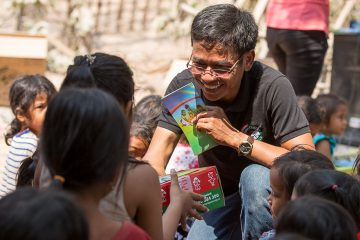
National Leadership Team Coordinator Sophea Sem distributes shoeboxes and The Greatest Gift Gospel booklet.
That spark of joy is significant for children trapped in a cycle of poverty with little expectation of a better future. Their parents are poor and toil day after day in factory jobs that usually pay less than $2 a day.
“If you are poor, your future has been chosen for you,” Sophea explained. “The future is not their goal. [The goal] is right now.”
Some children don’t go to school because their parents can’t afford it. Others stop going to school when they are teenagers and start working in the factories. An immediate need for money forces parents to send children to the factories instead of school.
For instance, Nimol hardly sees her mother because she works in a factory. She leaves home early and returns late at night. Although her father stays home taking care of their chickens and cows, much of the responsibility for Nimol’s two sisters and the household chores falls on her shoulders. Nimol, only 11 years old, truly carries a heavy load.
“I help cook, clean, and wash dishes,” Nimol said. “I help my mother cook before she goes to work.”
Expressions of happiness from Nimol don’t come often. But smiles abounded when she received her shoebox gift.
Through Operation Christmas Child, children like Nimol are given a reason to smile—some for the first time in a very long time.
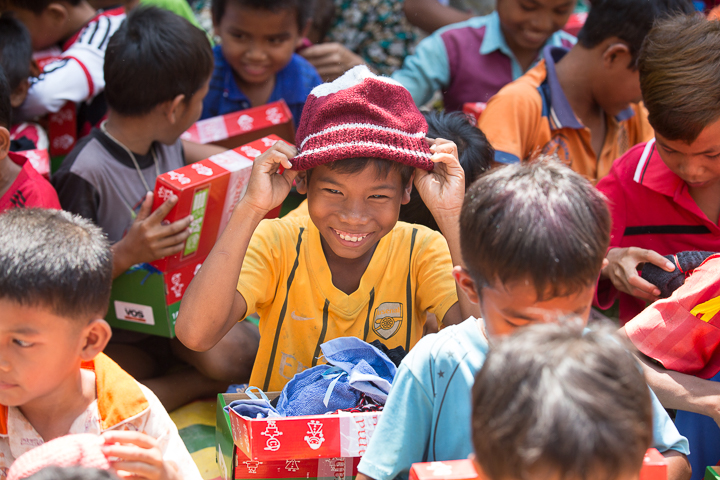
Operation Christmas Child shoebox gifts bring love and joy to boys and girls in Cambodia.

